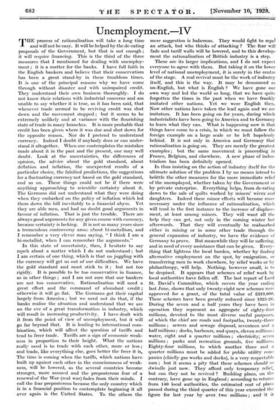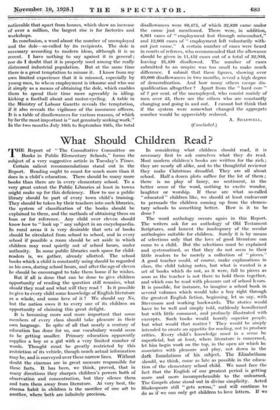Unemployment. IV
THE process of rationalization will take a long time and will not be easy. It will be helped by the de-rating proposals of the Government, but that is not enough ; it will require financing. This is the third of the three measures that I mentioned for dealing with unemploy- ment; it is a matter for the banks. I have full faith in the English bankers and believe that their conservatism has been a great stand-by in these troublous times. It is one of the principal reasons why we have come through without disaster and with unimpaired credit. They understand their own business thoroughly. I do not know their relations with industrial concerns and am unable to say whether it is true, as it has been said, that whenever trade seemed to be reviving credit was shut down and the movement stopped ; but it seems to be extremely unlikely and at variance with the flourishing state of trade in many branches. It is more probable that credit has been given where it was due and shut down for the opposite reason. Nor do I pretend to understand currency. Indeed I doubt if anybody does or can under- stand it altogether. When one contemplates the mistakes made about it in the past and the present, one may well doubt. Look at the uncertainties, the differences of opinion, the advice about the gold standard, about deflation and inflation, the unexpected results of a particular choice, the falsified predictions, the suggestions for a fluctuating currency not based on the gold standard, and so on. These things could not be if there were anything approaching to scientific certainty about it. The Germans did not understand what they were doing when they embarked on the policy of inflation which led them down the hill inevitably to a financial abyss. Yet they are able men, and had no doubt good arguments in favour of inflation. That is just the trouble. There are always good arguments for any given course with currency, because certainty is lacking. It is not so many years since a tremendous controversy arog,-.: about bi-metallism; and I remember a very clever man saying, "I think I am a bi-metallist, when I can remember the arguments."
In this state of uncertainty, then, I hesitate to say much about a matter which I do not understand ; but I am certain of one thing, which is that no juggling with the currency will get us out of our difficulties. We have the gold standard and must stick to it ; but not too rigidly. It is possible to be too conservative in finance, as in other things ; and I am not sure that our bankers are not too conservative. Rationalization will need a great effort and the command of abundant credit ; otherwise it will go flat. The Germans got their capital largely from America ; but we need not do that, if the banks realize the situation and understand that we are on the eve of a great transformation in industry, which will result in increasing productivity. I have dealt with ft from the point of view of unemployment, but it will go far beyond that. It is leading to international com- bination, which will affect the question of tariffs and tend to freer trade. Tariffs are a sign of economic weak- ness in proportion to their height. What the nations really need is to trade with each other, more or less ; and trade, like everything else, goes better the freer it is. The time is coming when the tariffs, which nations have built up against each other in the consciousness of weak- ness, will be lowered, as the several countries become stronger, more assured and the preposterous fear of a renewal of the War (real war) fades from their minds. I call the fear preposterous because the only country which is in a financial position to contemplate beginning it all over again is the United States. To the others the mere suggestion is ludicrous. They would fight to repel an attack, but who thinks of attacking ? -The fear will fade and tariff walls will be lowered, and to this develop- ment the rationalization of British industry is a step.
These are its larger implications, and I do nbt expect everyone to agree with them. But taking it on the lower level of national unemployment, it is surely in the centre of the stage. A real revival must be the work of industry itself, and this is the way. It may be denounced as un-English, but what is English ? We have gone our own way and led the world so long, that we have quite forgotten the times in the past when we have frankly imitated other nations. Yet we were English then. Now other nations have taken the lead again and we are imitators. It has been going on for years, during which industrialists have been going to America and to Germany to learn what they can. What is happening now is that things have come to a crisis, in which we must follow the foreign example on a large scale or be left hopelessly behind. It - is not only in America and Germany that rationalization is going on. They are merely the greatest examples ; but the same movement is proceeding in France, Belgium, and elsewhere. A new phase of indus- trialism has been definitely opened.
In thus insisting on the action of industry itself for the ultimate solution of the problem I by no means intend to belittle the other measures for the more immediate relief of the unemployed, whether taken by the Government or by private enterprise. Everything helps, from de-rating down to the sale of quilts worked by miners' wives and daughters. Indeed these minor efforts will become more necessary under the influence of rationalization, which will tend in the first instance to the increase of displace- ment, at least among miners. They • will want all the help they can get, not only in the Coming winter but afterwards. That they will eventually be reabsorbed either in mining or in some other trade through the general expansion of industry, we have the evidence of Germany to prove. But meanwhile they will be suffering, and in need of every assistance that can be given. Every- thing that lightens the local burden, whether by finding alternative employment on the spot, by emigration, or transferring men to work elsewhere, by relief works or by philanthropy, will help. Nothing, however small, is to be despised. It appears that schemes of relief work by local authorities have fallen off. The last report of Lord St. David's Committee, which covers the year ending last June, shows that only twenty-eight new schemes were approved for a grant, of the total value of 1319,000. These schemes have been greatly reduced since 1925-26. During the seven and a half years they have been in operation they represent an aggregate of eighty-four millions, devoted to the most diverse useful purposes, of which the chief are roads and footpaths, twenty-three millions ; sewers and sewage disposal, seventeen and a half millions ; docks, harbours, and quays, eleven millions ; water, eight and a quarter millions ; electricity; seven millions ; parks and recreation grounds, five millions. Eighty-four millions, to which another three 'and a quarter millions must be added for public utility com- panies (chiefly gas works and docks), is a very respectable sum ; but it seems a pity that these schemes should so dwindle just now They afford only temporary relief, but can they not be revived ? Building plans, on the contrary, have gone up in England ; according to eturns from 140 local authorities, the estimated cost of plans passed during the third quarter of this year- exceeded the figure for last year by over two millions ; and- it is noticeable that apart from houses, which show an increase of over a million, the largest rise is for factories and workshops.
In conclusion, a word about the number of unemployed and the dole—so-called by its recipients. The dole is necessary according to modern ideas, although it is so recent. I have nothing to say against it in general ; nor do I doubt that it is properly used among the really distressed industrial population. But at the same time there is a great temptation to misuse it. I know from my own limited experience that it is misused, especially by young men, to whom employment is irksome and who use it simply as a means of obtaining the dole, which enables them to spend their time more agreeably in idling, kicking a football about and motor-cycling. A table in the Ministry of Labour Gazette reveals the temptation, if it also reveals the vigilance of the insurance officers. It is a table of disallowances for various reasons, of which by far the most important is "not genuinely seeking work." In the two months July 10th to September 10th, the total disallowances were 80,475, of which 32,820 came under the cause just, mentioned. There were, in addition, 8,361 cases of "employment lost through misconduct," and 12,001 cases of "employment left voluntarily with- out just cause." A certain number of cases were heard in courts of referees, who recommended that the allowance should be given in 11,452 cases out of a total of 32,910, leaving 21,450 disallowed. The number of cases submitted to an umpire was too small to make much difference. I submit that these figures, showing over 69,000 disallowances in two months, reveal a high degree of demoralization. And how many others escape dis- qualification altogether ? Apart from the "hard core" of 7 per cent. of the unemployed, who consist mainly of men over 45, there are the others who are constantly changing and going in and out. I cannot but think that if the system were somewhat changed the aggregate number would be appreciably reduced.













































 Previous page
Previous page